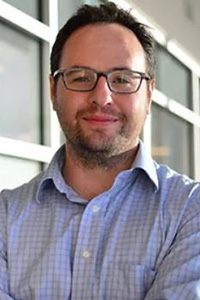2022 Leading Research Achievements
We are pleased to present you with the 2022 Leading Research Achievements by BBRF Grantees, Prize Winners & Scientific Council Members. They are presented in the order of their publication in scientific journals.
Discovering How tDCS Brain Stimulation Therapeutically Modifies Brain Circuits in Depression
Next-Generation Therapies: Depression

- Evangelia G. Chrysikou, Ph.D., Drexel University; 2015 BBRF Young Investigator
Researchers found mechanistic evidence supporting the ability of tDCS (transcranial direct current stimulation), a form of non-invasive brain stimulation, to help patients with moderate to severe depression. Among other things, they showed that tDCS influences connections between the medial prefrontal cortex and the amygdala, both of which have been implicated in emotional processing and emotion regulation. Results represent an important step toward understanding mechanisms of action of tDCS as a potentially safe, low-cost, and effective treatment for depression. Read more.
Biological Psychiatry: Cognitive Neuroscience & Neuroimaging, January 1, 2022
Non-Invasive TMS Brain Stimulation Activates Deep-Brain Region Important in Depression
Next-Generation Therapies: Depression

- Sarah H. Lisanby, M.D., National Institute of Mental Health, Duke University; BBRF Scientific Council; 2010 BBRF Distinguished Investigator; 2003 Independent Investigator; 1996 Young Investigator; 2001 BBRF Klerman Prize
Individually targeted transcranial magnetic stimulation (TMS) was used to activate an important depression-related target located deep within the brain. This suggests the potential of non-invasive stimulation therapies to reach important brain areas previously thought beyond their reach, in depression and other psychiatric illnesses. Read more.
NeuroImage, January 1, 2022
Researchers Identify a Neural Signature Centrally Important in Restructuring Negative Self-Beliefs
Basic Research: Depression, Anxiety, PTSD, Borderline Personality Disorder

- Trevor Steward, Ph.D., University of Melbourne, Australia; 2020 BBRF Young Investigator
Little is known about what happens in the brain when CBT or other therapies succeed in helping patients in the task of cognitive reappraisal. This research describes a novel neural signature that comes into play when a person restructures negative self-beliefs and proposes a new theory about brain mechanisms responsible for enabling people to sustain complex mental representations of the self. The findings have potential implications for targeting brain stimulation treatments to help alleviate symptoms of self-impairing negative self-beliefs. Read more.
Molecular Psychiatry, January 1, 2022
Evidence That Cognitive Behavioral Therapy Can Help People With Insomnia Who Also Are Depressed or Anxious
Next-Generation Therapies: Depression, Anxiety, PTSD

- Lauren D. Asarnow, Ph.D., University of California, San Francisco; 2019 BBRF Young Investigator
A large body of research has demonstrated the effectiveness of CBT-I, a specialized form of cognitive behavioral therapy, in treating chronic insomnia in adults without psychiatric co-morbidities. Dr. Asarnow and colleagues conducted a review of recent research and found evidence of the importance of treating insomnia symptoms in people who also suffer from either depression, anxiety, or PTSD. Comorbid participants of such trials who did experience an improvement in insomnia symptoms were more likely to have better depression outcomes; more research is needed to determine how it impacts symptoms in anxiety and PTSD. Read more.
Current Psychiatry Reports, January 21, 2022
A Molecule Tested in Higher Primates Reduced Alcohol Consumption By Half
Next-Generation Therapies: Addiction

- Kyle H. Flippo, Ph.D., University of Iowa; 2019 BBRF Young Investigator
Administering a hormone called FGF21, researchers were able to reduce alcohol consumption by about 50% in monkeys exhibiting a strong preference for alcohol. The experiments also provided evidence of a liver-to-brain circuit that specifically regulates alcohol consumption. Read more.
Cell Metabolism, February 1, 2022
Comprehensive Analysis Suggests Metacognitive Training Can Be Effective in Schizophrenia and Psychotic Disorders
Next-Generation Therapies: Schizophrenia, Psychosis

- Martin Lepage, Ph.D., McGill University; 2002 BBRF Young Investigator
- Steffen Moritz, Ph.D., University Medical Center Hamburg-Eppendorf, Germany; 2014 BBRF Independent Investigator; 2008, 2005 Young Investigator
A meta-analysis of 43 prior clinical trials testing metacognitive training (MCT) for psychosis concluded MCT is an effective treatment, with benefits still evident in patients 1 year following the end of MCT sessions. In MCT, a therapist or facilitator enters into discussions with a group of patients, seeking to discover what they believe about their own thoughts. MCT targets maladaptive thinking styles common to psychosis, which include jumping to conclusions, inflexibly holding on to beliefs, and being overconfident in initial judgments. Read more.
JAMA Psychiatry, March 23, 2022
Important New Research on Schizophrenia Genetics Provides Strongest Evidence to Date of Problems at the Brain’s Synapses
Basic Research: Schizophrenia

- Tarjinder Singh, Ph.D., Columbia University; 2019 BBRF Young Investigator
In two papers published concurrently, an international team composed of hundreds of scientists provided the most comprehensive picture to date of how variations in the human genome affect schizophrenia risk. Their work contains some of the most compelling indications linking the illness with problems at the synapse—the gaps across which neurons in the brain communicate. Read more.
Nature, April 8, 2022
Stem Cell Technology Helps Identify a Potential Causal Mechanism in Schizophrenia That Could Be Targeted
Basic Research: Schizophrenia

- Lorna A. Farrelly, Ph.D., Icahn School of Medicine at Mount Sinai; 2019 BBRF Young Investigator
- Kristen Brennand, Ph.D., Yale University; BBRF Scientific Council; 2018 BBRF Maltz Prize; 2016 BBRF Independent Investigator; 2012 BBRF Young Investigator
Using stem-cell technology, researchers identified an aberrant gene-regulation pattern called hyperacetylation that may be causally involved in some cases of schizophrenia. Acetyl molecules attach to DNA packaging proteins to encourage or repress gene activation. Hyperacetylation means that there are too many acetyl molecules attaching to bundles of DNA called histones, causing one or more genes to be abnormally regulated. The team identified a specific protein, BRD4, which, if blocked or repressed, might help alleviate the severity of the aberration. Read more.
Nature Communications, April 22, 2022
Video Game-Based Intervention Helped Reduce Cognitive Deficits in Depressed Patients
Next-Generation Therapies: Depression

- Richard S.E. Keefe, Ph.D., Duke University; BBRF Scientific Council; 2003 BBRF Independent Investigator; 1995, 1991 Young Investigator
Researchers testing a novel video game-based intervention in depressed patients found that it can reduce the severity of an important form of cognitive deficit—the ability to remain engaged and pay attention to a task over a sustained interval. Read more.
American Journal of Psychiatry, April 12, 2022
Researchers Discover Potentially Targetable Brain Circuit Controlling Cocaine Withdrawal Anxiety and Relapse
Basic Research: Addiction

- Kevin Beier, Ph.D., University of California Irvine School of Medicine; 2017 BBRF Young Investigator
Researchers discovered an extended brain circuit involved in cocaine addiction. The circuit regulates withdrawal anxiety and the urge to take cocaine again. Distinct from reward circuits driven by dopamine, the newly identified circuit might be targeted by novel therapeutic agents to reduce the negative affect that develops during withdrawal as well as to prevent relapse. Read more.
Cell Reports, May 3, 2022
Precise Imaging Reveals How a Key Receptor's Signaling Is Modulated—A Spur to Improving Psychiatric and Other Drugs
Basic Research: All Mental Illlnesses

- Wesley B. Asher, Ph.D., Columbia University; 2014 BBRF Young Investigator
- Jonathan Javitch, M.D., Ph.D., Columbia University/NY State Psychiatric Institute; BBRF Scientific Council; 2010 BBRF Distinguished Investigator; 2003 Independent Investigator; 1992, 1990 Young Investigator
Researchers have obtained powerful new insights into mechanisms involved in GPCRs, cellular receptors whose signaling is implicated in many psychiatric disorders. GPCRs are the target of one-third of all approved drugs, including therapeutics prescribed for psychiatric disorders including schizophrenia, bipolar disorder, and depression. The dopamine D2 receptor, which is the target of all current antipsychotic medicines, is a GPCR, for example. The research will aid efforts to improve the action of drugs that interact with GPCRs, including psychiatric drugs, to make them more effective and/or to reduce side effects. Read more.
Cell, May 12, 2022
A Circuit Causally Linked With Spontaneous Nicotine Addiction Remissions May Be a Powerful Addiction Treatment Target
Basic Research, Next-Generation Therapies: Addiction

- Shan H. Siddiqi, M.D., Harvard Medical School; 2022 BBRF Klerman Prize; 2019 BBRF Young Investigator
By studying 129 people who were addicted to nicotine at the time they suffered brain damage, a team of researchers has identified a brain network they believe is causally linked with remission from nicotine addiction and that can be targeted with non-invasive brain stimulation. Read more.
Nature Medicine, June 3, 2022
Clinical Trial Compared Different Forms of Exposure and Drug Therapy in Combat Veterans with PTSD
Next-Generation Therapies: PTSD

- Francis S. Lee, M.D., Weill Cornell Medicine; BBRF Scientific Council; 2010 BBRF Independent Investigator; 2005, 2002 Young Investigator
In a step toward precision medicine, a clinical trial found that two forms of exposure therapy enabled combat veterans to significantly reduce PTSD symptoms. Whether or not a subject also experienced depression affected which form of treatment was more effective. Those carrying either of two common genetic variations affecting processes that may impact fear extinction also showed evidence of having distinct therapy responses. Read more.
Translational Psychiatry, July 22, 2022
Researchers Identify Molecule That Orchestrates Association of Events With Positive and Negative Memories
Basic Research: Depression, Anxiety, PTSD

- Kay M. Tye, Ph.D., Salk Institute for Biological Studies; BBRF Scientific Council Emeritus; 2016 BBRF Freedman Prize; 2013 BBRF Young Investigator
Researchers discovered that neurotensin, a neurotransmitter, orchestrates a process in the brain’s amygdala that enables us to assign positive and negative “tags” to specific memories. Targeting this molecule might be the aim of future treatments for individuals who fixate on or overstress negative memories. Read more.
Nature, July 20, 2022
Home-Based tDCS Brain Stimulation Treatments Reduced Inattention in Adults with ADHD
Next-Generation Therapies: ADHD

- Douglas Teixeira Leffa, M.D., Ph.D., Universidade Federal do Rio Grande do Sul, Brazil
Researchers have obtained promising results in a clinical trial of a home-based non-invasive brain stimulation treatment for adults with ADHD. The treatment, using low-power transcranial direct current stimulation (tDCS) technology, was associated with lower inattention symptoms in patients. Read more.
JAMA Psychiatry, August 3, 2022
FDA Clears SAINT Rapid-Acting Brain Stimulation Approach for Those Suffering From Resistant Major Depression
Next-Generation Therapies: Depression

- Nolan R. Williams, M.D., Stanford University; 2019 BBRF Klerman Prize; 2018, 2016 BBRF Young Investigator
The FDA gave clearance for a commercial application of the SAINT brain stimulation protocol developed by Dr. Williams and colleagues. In a recent clinical trial, SAINT enabled 79 percent of patients with refractory major depression to achieve remission after only 5 days of accelerated non-invasive treatments. Read more.
FDA announcement made September 6, 2022
Folic Acid Supplements Were Associated With Lower Suicidality in Large Database Study
Next-Generation Therapies: Suicide Prevention

- J. John Mann, M.D., Columbia University/NY State Psychiatric Institute; BBRF Scientific Council; 2022 BBRF Colvin Prize; 2008 BBRF Distinguished Investigator
In a promising lead in suicide prevention, researchers found that in a cohort of over 866,000 people prescribed folic acid supplements over 5 years, there was a 44% lower rate of suicidal events during periods when the supplements were being taken vs. when they were not being taken. Read more.
JAMA Psychiatry, September 28, 2022
Adding an Antibiotic Improved Brain Stimulation Results in Depression
Next-Generation Therapies: Depression

- Alexander McGirr M.D., Ph.D., University of Calgary, Canada; 2018 BBRF Young Investigator
By providing 2 weeks of antibiotic therapy using the drug d-cycloserine during a 4-week treatment course with iTBS, a form of non-invasive brain stimulation, researchers were able to show significantly improved outcomes in patients with moderate to severe major depression. Read more.
JAMA Psychiatry, October 12, 2022
Lab-Grown Human Neurons Transplanted into the Rat Brain Grew, Connected, and Promise to Shed Light on Psychiatric Illness
Basic Research: All Mental Illnesses

- Sergiu Pasca, M.D., Stanford University; 2017 BBRF Independent Investigator; 2012 Young Investigator
Researchers grew organoids composed of human cortical neurons and transplanted them into the rat sensory cortex. The human cells integrated functionally into the rat brain—could receive sensory stimulation and drive behavior. The same approach enabled the team to study pathology in human cells transplanted from patients with a neuropsychiatric disorder, a strategy that can also be applied in other disorders. Read more.
Nature, October 12, 2022
After ‘Priming’ with Ketamine, Patients Receiving Self-Esteem Training Had Extended Antidepressant Benefits, Study Finds
Next-Generation Therapies: Depression

- Robert H. Howland, M.D., University of Pittsburgh; 1991 BBRF Young Investigator
- Sanjay J. Mathew, M.D., Baylor College School of Medicine; 2009 BBRF Independent Investigator; 2006, 2001 Young Investigator
In a randomized placebo-controlled clinical trial, ketamine’s rapid antidepressant effect which normally fades within a week was still present after 30 days for treatment-resistant participants who received a single ketamine injection and 4 days of computer-administered self-esteem training. Read more.
American Journal of Psychiatry, December 1, 2022



